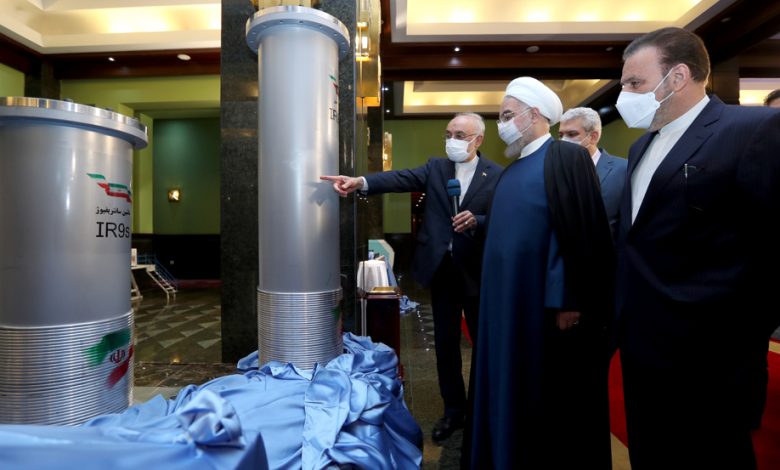
Iran’s permanent representative to Vienna-based international organizations Kazem Gharibabadi made the announcement in a tweet late Tuesday, expressing hope that the move will help the country increase the manufacturing of radiopharmaceutical products that are also higher in quality.
Meanwhile, the Atomic Energy Organization of Iran said in a tweet on Wednesday that sanctions, the assassination of nuclear scientists, and the destruction at Natanz centrifuge assembly center “all demonstrate the frustration of the enemies,” and that the willpower of Iranian scientists has “turned all such unwise acts into desperation.”
The organization also emphasized that Natanz nuclear site will continue to work at full blast in spite of the recent terrorist attack.
Iran announced on Tuesday evening that it had informed the International Atomic Energy Agency (IAEA) of a plan to start enriching uranium up to 60 percent purity, following a suspected Israeli act of sabotage on Iran’s Natanz nuclear site.
Under the plan, Iran will install 1,000 new centrifuges at the facility in addition to the 5,060 centrifuges already there, some of which may have been damaged, Deputy Foreign Minister Abbas Araqchi said in Vienna, where he is slated to attend another round of negotiations over revitalizing the JCPOA.
Araqchi said “the Natanz incident has strengthened our determination for progress in both the nuclear field and negotiations. Contrary to what some may think, our hands are now much fuller in negotiations.”
“Sanctions must be lifted completely, and then verified. Later, Iran will return to its commitments [under the JCPOA]. This is our position and the rest depends on how much the other parties want to go along with this logical stance,” Araqchi said.
“We are not here to waste our time. Tangible progress must be made so we can return to Tehran with a conclusion at the end of this round of talks,” the top negotiator addd.
A senior Russian diplomat has reacted to Iran’s recent decision to significantly boost uranium enrichment, saying Tehran is “transparent” regarding the measures it has taken in retaliation for Washington’s withdrawal from the 2015 multilateral nuclear deal and the subsequent imposition of sanctions.
“As always Iran is very transparent in its deviations from JCPOA. Needless to say that we aren’t happy with this but we are used to think big,” Russia’s Permanent Representative to the International Organizations in Vienna Mikhail Ulyanov tweeted on Wednesday, referring to the Iran nuclear agreement by the acronym of its official name, the Joint Comprehensive Plan of Action.
“We need to focus not on current difficulties but on restoration of JCPOA. If we succeed, this and other problems will be settled soon,” he added.
IAEA confirms Iran’s new enrichment level
Meanwhile, the IAEA confirmed in a statement Iran’s intention to increase the level of its uranium enrichment.
In a report to member states, IAEA Director General Rafael Grossi “said Iran had informed the Agency that the country intends to start producing UF6 enriched up to 60 percent.”
In another development, a Wall Street Journal reporter cited sources as saying that IAEA inspectors will visit Natanz nuclear facility on Wednesday.
On Tuesday, Iran’s Foreign Minister Mohammad Javad Zarif said Natanz will move forward with more advanced and powerful centrifuges.
“If the Israelis thought that they could stop Iran from following up on the removal of sanctions imposed on the Iranian people, then they made a very bad gamble,” he noted.
Envoys from Iran and the P4+1 group of countries — Britain, France, Russia, and China plus Germany — wrapped up the first round of the discussions in the Austrian capital on Friday.
A US delegation had also traveled to Vienna, but it did not have Iran’s permission to attend the talks.
During the negotiations, two expert-level working groups discussed the sanctions Washington might remove as well as the nuclear curbs Tehran might observe, and reported their conclusions to the JCPOA Joint Commission.
The new round of the Vienna talks was supposed to start on Wednesday, but it was postponed to Thursday after a member of the European team tested positive for COVID-19.
US says committed to Iran talks
Additionally on Tuesday, the White House said it remains committed to the nuclear negotiations despite what it called Tehran’s “provocative” statement on uranium enrichment.
“We are certainly concerned about these provocative announcements,” President Joe Biden’s press secretary, Jen Psaki, told reporters. “We believe that the diplomatic path is the only path forward here and that having a discussion, even indirect, is the best way to come to a resolution.”
Describing last week’s Vienna talks as “constructive,” she said, “While (talks) were difficult and while we expect this to be long, we expect and we have not been alerted of any change in planned attendance in meetings that will resume later this week.”







